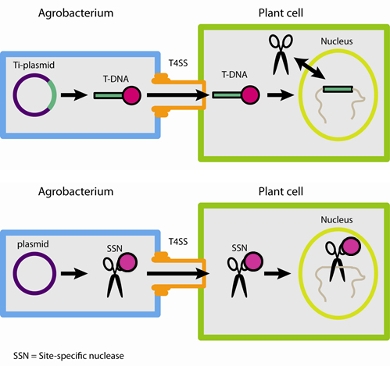Research project
Agrobacterium-mediated protein therapy for genome editing
Is translocation of nucleases possible via Agrobacterium T4SS and is it efficient enough for mutagenesis?
- Duration
- 2011 - 2016
- Funding
-
 TTI Green Genetics
TTI Green Genetics

The aim of this project is to develop a method for targeted mutagenesis – also called “genome editing” - of plant genes via a non-GMO approach, using site-specific nuclease proteins expressed in Agrobacterium and transported via its type four secretion system (T4SS) to plant cells.
In order to achieve targeted mutagenesis in plant genomes, double strand breaks (DSBs) can be induced by site-specific nucleases. Since repair of DSBs via NHEJ can result in the appearance of a variety of small deletions or insertions, so-called indels, a desirable change can in principle be obtained. For the introduction of site-specific DSBs, it would be of great advantage if the required nucleases, could be introduced directly as proteins, so that the plant is not classified as GMO. This can be achieved by protein transfer via the Agrobacterium type 4 secretion system (T4SS), which is used for transfer of DNA and proteins to recipient cells.
Material & Methods
Nucleases will be expressed in Agrobacterium equipped with a translocation protein domain derived of one of the Vir proteins. After transfer, the nucleases will induce double strands breaks (DSBs) at a specific location in the genome, which upon imperfect repair via non-homologous end joining (NHEJ) results in mutations.

